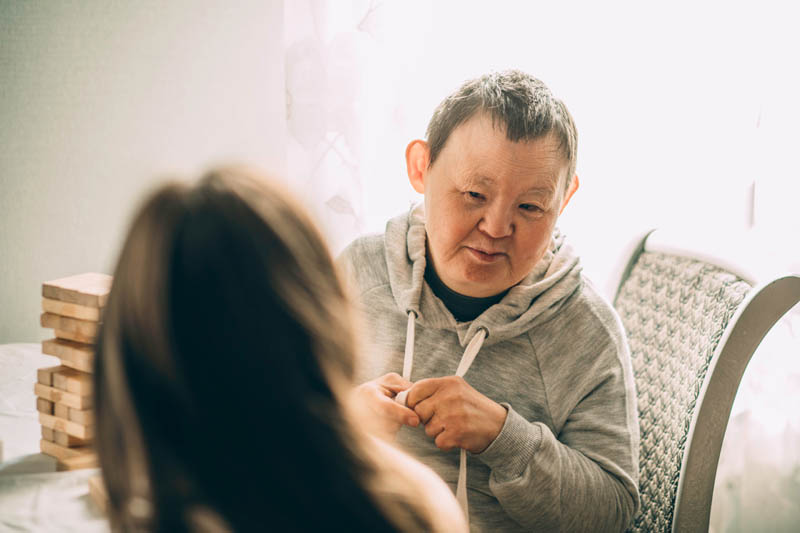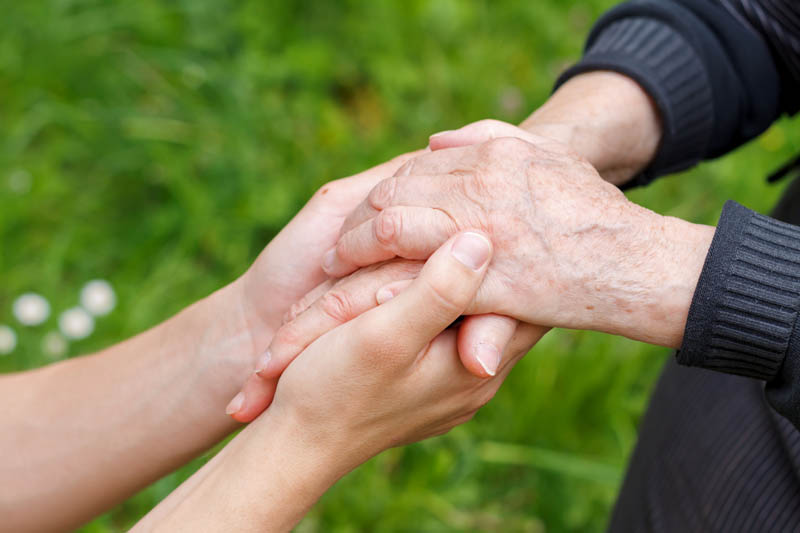The community trusts and expects service providers to uphold and apply proper standards.
As a support worker, you must always act in a professional and ethical manner and demonstrate familiarity with the laws, rules, standards and regulations that are relevant to the community services industry. These protect the rights of both individuals and workers. They also ensure that safe, high-quality services are provided.

Image by TierneyMJ, Shutterstock, Shutterstock licence
Your job role and your specific duties and responsibilities will be determined by laws and regulations, as well as the policies and procedures of your organisation. Legislation specifies the laws of our society. Policies are rules and regulations that state how the government and organisations will comply with legislative requirements.
Most professions, including the community services sector, have codes of ethics that provide a framework for professional behaviour and promote high standards.
Laws that affect your work
Some laws that affect your role are shown below.
 Select to learn more
Select to learn more
Select each bar to expand and reveal further information.
Legislation and regulations
The Australian legal system establishes the rights of individuals and makes sure these rights are enforceable by law.
As a support worker, many of your work obligations, as outlined by your position description, are based on your legal obligation to work within the law and understand the relevant legal framework.
Legislation and regulations that apply to community services include:
- Workplace health and safety
- Privacy and confidentiality
- Mandatory reporting
- Discrimination
- Industrial relations
- Duty of care
- Human rights
 Watch the video
Watch the video
Watch ‘What does human rights mean to you?’ from the Australian Human Rights Commission.
What is your perspective on the declaration that, 'All human beings are born free and equal in dignity and rights'?
Legislation for various sectors
There is specific legislation that targets particular community services sectors, such as mental health, disability, aged care and child protection. These sets standards for the way services must be provided.
 Select to learn more
Select to learn more
Select each bar to expand and reveal further information and examples of legislation specific to various community services sectors.
Breaching sector-specific legislation
Laws underpin service provision and service providers must adhere to legislation to receive government funding. In this way, legislation guides and controls service provision through funding. Each sector is monitored and evaluated against the legislated standards.
If service providers breach relevant legislation and service standards are not met, they will be notified and given a set time period to make any necessary changes. If this is not done, funding may be withdrawn. Legislation upholds service standards, protects the rights of users, and provides avenues for people receiving services and their advocates to raise concerns and make complaints.
Complaints about breaches of sector-specific legislation may be dealt with by federal or state government bodies, depending on the industry sector. Each industry sector has rules for the way breaches are dealt with.

Image
by Aiman Dairabaeva,
Shutterstock, Shutterstock licence
 Case study
Case study
Mary works at a community activity centre for people with disability. Her organisation has policies that explain her legal requirements and her job description sets out her responsibilities.
David is a support worker in a residential service for people recently discharged from mental health services. His organisational policies explain his legal obligations and his duty statement sets out his responsibilities.
Marco provides support for children, refugees and people who experience domestic and family violence. his work is guided by state legislation on working with children, federal legislation regarding refugees and migrants, and state legislation around domestic and family violence. He can access information provided by child protection authorities on issues relating to child protection and family violence.
Mary, David and Marco can find the ethical and practice benchmarks of their industry in the Australian Community services workers’ Code of Ethics and the Australian Community Work Practice Guidelines, published by the Australian Community Workers Association (ACWA).
 Reflect
Reflect
What strategies do you employ to ensure that your work consistently aligns with current legal requirements and standards?
Reflecting on your professional practice, how do you stay informed and up to date with legal changes that affect your duties?
Record your responses in your digital device.
Work health and safety
Work health and safety (WHS) law in Australia is legislated and regulated separately by each of Australia’s states, territory and Commonwealth jurisdictions. To ensure consistency across the country, a uniform set of laws known as the model WHS laws have been broadly adopted. These model WHS laws are:
- The model WHS Act (Work Health and Safety Act 2011 (Cth))
- The model WHS Regulations
- Model Codes of Practice
These laws aim to create a unified approach to workplace health and safety. The Commonwealth works closely with the states and territories through Safe Work Australia to develop and maintain the model WHS laws. Every jurisdiction, except for Victoria, has implemented these model laws. Victoria, while not adopting the model WHS laws, has established similar duties and responsibilities for workplace safety under its Occupational Health and Safety Act 2004 (Vic).
The objectives of WHS laws are to:
- promote and secure the health and safety of workers
- eliminate workplace risks
- ensure public safety
- improve outcomes for injured workers
- reduce the economic impact of workplace injuries and illnesses on the economy.
WHS laws cover duty of care principles. This means that everyone in a workplace has a duty and responsibility to contribute to their own and other people’s safety. Employers have a duty to provide a safe workplace, and workers have a duty to follow WHS policies and procedures and to identify and report safety issues.
In community services work, depending on how the service is delivered, workplaces may be in the community in a public location, or the home of the person receiving the service, as well as offices, residential facilities and other buildings owned or rented by the service provider. A range of settings means that WHS requirements need to be applied to specific workplace environment for example, the client's home may be your workplace.
 Research to learn more
Research to learn more
Conduct research into the model WHS laws in your State or Territory related to the community services sector, making note of:
- how the laws relate to support worker’s responsibilities
- how the laws relate to community service employer responsibilities.
Record your responses in your digital device.
Breaching WHS legislation
Breaches of WHS can result in serious injury, lasting harm and even death. In community services, WHS legislation covers the people receiving services as well as workers, managers, volunteers and members of the public. Safety refers to physical, emotional, or psychological safety.
In recent years, WHS legislation has expanded to cover non-physical harm that can come from stress and bullying. In community services, people using the service may be particularly vulnerable or have special needs. Breaches of WHS legislation may affect their physical and emotional wellbeing, as well as that of workers. Breaches of WHS can have a lifelong impact on people receiving services as well as on workers.
A breach of WHS legislation can be penalties outlined in Safe Work Australia’s policies and regulations. These can lead to court-sanctioned penalties, including the closure of the workplace. In a community services setting, this would have direct consequences for people receiving services.
For example, a breach of WHS law in Queensland is deemed to occur when:
- the conduct of a person conducting a business or undertaking (PCBU) or senior officer negligently causes the death of a worker
- someone acts in a way that places a person at risk of injury, illness or death
- steps are not taken to avoid a risky situation from occurring
- there is a failure to comply with regulatory requirements.
 Read to learn more
Read to learn more
On-the-spot fines may be issued for WHS offences. You can find more information about penalties at Penalties under the WHS laws.
 Check your understanding
Check your understanding
Respond to the questions below and select ‘Check’ to see if you are correct. Select the 'Next' button to move to the next question, then select 'Check' again for feedback
Privacy
People receiving support services have a right to expect that their personal and health information will remain private and secure. Records kept about a person, such as progress notes or incident reports, are legal documents and must be collected and archived according to your workplace’s policies and procedures, which are guided by legislation.
Image by Pixel-Shot, Shutterstock, Shutterstock licence
 Watch the video
Watch the video
Watch ‘Privacy and confidentiality’, which demonstrates how these laws work in practice.
Why can’t the worker give Lillian’s niece her personal information?
How comfortable would you be denying access to someone to protect the privacy of your client?
Australian Privacy Principles (APPs)
The APPs outline 13 national privacy principles that apply to the collection, use, storage and disposal of people’s information.
Organisations base their privacy policy and confidentiality maintenance procedures and protocols on these principles.
The 13 privacy principles govern standards, rights and obligations around:
- the collection, use and disclosure of personal information
- an organisation or agency’s governance and accountability
- the integrity and collection of personal information
- the rights of individuals to access their personal information.
 Read to learn more
Read to learn more
Visit the Australian Privacy Principles guidelines to learn how to apply the APPs to your work role.
Confidentiality
Maintaining confidentiality is crucial in the community sector. As a support worker, you have access to sensitive and privileged information about individuals. It's essential to respect their privacy and rights by not disclosing personal information without their consent. However, there are exceptions where disclosure is necessary, such as when there is a risk of harm.
Personal information should only be shared with a manager or coordinator when needed. There must be clear purpose for collecting, storing, accessing and distributing personal information. Follow your organisational policies to to limit access to information to only those people directly involved in the support of the person.
 Important
Important
A person’s record is highly confidential. You may be required to sign a confidentiality agreement when you are first employed, saying you will not divulge any information you have acquired during or after your involvement with people you provide services to, unless they have given consent or you are legally required to do so.
 Case study
Case study
Tony works for the council's home care service in a small country town where everyone knows each other. He has started work supporting Ernie, who lives with his family because of his dementia. The family runs a small business from home.
One day, while Tony is standing in the queue at the supermarket, he takes a call from his supervisor. Tony tells his supervisor that he thinks Ernie’s family is having financial problems. He overheard them saying this while he was walking past their home office.
Although Tony does not mention any names, it is clear to the woman standing in the queue behind him that Tony is talking about her next-door neighbours. The woman goes home and tells Ernie’s family that she heard all about their financial difficulties. When they ask her how she knows this, she tells them she overheard Tony talking about it on the phone. Tony gets a call from his supervisor and is given a warning because this is a breach of confidentiality. The family is angry and dont want Tony to return to their home.
 Reflect
Reflect
Reflecting on Tony's situation, what steps could he have taken to maintain the families confidentiality?
How does breaking confidentiality impact the trust between support workers and the people they support?
What lessons can be learned from this scenario?
Record your responses in your digital device.
 Read to learn more
Read to learn more
Visit Who has rights under the Privacy Act? to read more about how the Privacy Act affects you and those you support.
 Select to learn more
Select to learn more
Select the items on the image to reveal ways to safeguard confidential information.
Image
by Ground Picture, Shutterstock, Shutterstock licence
Sharing information with services
Sometimes you will work with other agencies to provide support to a person.
A person (or their representative) must give consent before any information is shared with or accessed by another
agency. Most community organisations obtain this consent on a specific
form.
Consent needs to be given for access to particular information for a particular
purpose. You must not pass on information without the person’s consent. People receiving services have a
right to know what you record about them and to see their own records.
Some of the information that is shared between agencies includes:
- Information for a referral to a specialist agency or professional
- Incident reports that needs to be recorded
- The persons' individual support or care plans
- Information about individual needs and preferences
 Read to learn
more
Read to learn
more
Visit the Queensland government’s Authority to request or disclose personal information to external parties form to see an example of a standard disclosure form.
Disclosure
There are some instances when you must disclose information to others. For example, when a person is being referred for medical treatment, the hospital, doctor or
specialist needs to know the person’s history, allergies and relevant personal details. You must always obtain
the person’s informed consent before you disclose personal or health information to a third party.
 Select to learn more
Select to learn more
Select the items on the image to reveal ways to safeguard confidential information.
Image
by XiXinXing, Shutterstock, Shutterstock
licence
Breaching privacy and confidentiality laws
Breaching confidentiality can have serious consequences for the person you are providing services to, for you as a support worker, for your employer and for your profession. It can seriously affect the working relationship and trust between you and the person receiving support. When the person’s trust of others is undermined, the person may choose not to receive the services they need.
If the person has suffered harm or loss as a result of your actions, you or your employer may be sued. If you violate an important policy, you may lose the protection of vicarious liability and could be sued personally. Breaching privacy legislation may constitute a criminal offence, depending on the nature and severity of the breach, and the sensitivity and potential harm caused by the disclosure of the information.
Discrimination
Workplaces must promote equality of opportunity for everyone. It is unlawful to discriminate against people on the basis of age, gender, ethnicity, disability or impairment, marital status, sexual preference, or political or religious beliefs. Organisations within Australia must comply with a variety of federal Acts, national standards, and state Acts aimed at preventing discrimination and foster equality of opportunity.
 Select to learn more
Select to learn more
Select each bar to expand and reveal further information about national anti-discrimination legislation.
 Watch the video
Watch the video
Watch ‘Disabilities covered by the Disability Discrimination Act’ to hear from a past Disability Discrimination Commissioner.
What disabilities are not covered by the Act?
Breaching discrimination legislation
Discriminating denies the person their basic human right to be treated fairly and equally. It can damage a person’s dignity, self-esteem and status, and can also result in harm to the person if they choose not to receive services essential to the person’s wellbeing.
Your breach can affect your organisations' assessment of service standards, which may result in a possible loss of funding. This, in turn, may affect all the people who receive services from that organisation.
The person who has been discriminated against has recourse to internal and external complaints procedures. Depending on the basis of the discrimination and the state in which it occurs, the person may have recourse to an ombudsman or commissioner who deals with complaints about discrimination. If the discrimination amounts to a breach of human rights, the person can access the Australian Human Rights Commission.
If you breach discrimination legislation, you may be:
- reprimanded
- required to participate in performance management and training
- dismissed
- subject to legal penalties.
Duty of care
Community service organisations and workers have a duty of care towards people receiving their services, meaning they are responsible for ensuring their safety and wellbeing. Duty of care is part of the body of common law and is not covered by a specific legislative act. It is part of the broader legal concept of negligence.
A duty of care exists when someone’s actions could reasonably be expected to affect another person. This principle is based on the worker taking reasonable care to avoid an act or omission (a failure to act) that may cause foreseeable harm to any person. You must think ahead about possible risks to the person using your service, as well as to co-workers or others, and make sure you follow the organisation’s policies and procedures, which are designed to keep both you and the people you work with safe.
If you are acting within your specified role, working within the law and following your employer’s policies, procedures and guidelines, you are protected by a legal principle called vicarious liability. This means that as long as you work within your role and follow legislative requirements, policies and procedures, if something goes wrong and harm occurs, it is your employer who assumes legal liability.
If you are acting outside your specified role, or not following legislative requirements, policies and procedures, you lose this protection and may be sued personally. This is one reason why it is essential that you understand all the duties and requirements of your work role and do not act outside of its scope.

Image by Ocskay Mark, Shutterstock, Shutterstock licence
Negligence and harm
Negligence occurs when a duty of care has been breached and harm to either person or property has occurred. It is the legal and ethical obligation of any community services worker, supervisor or organisation to ensure that people using your services are not exposed to unnecessary or unreasonable risk.
Negligence can be an action or an omission; that is, it can arise from something you do, or something you fail to do, which results in foreseeable harm to another person. In some cases, harm may also include damage to a person’s reputation or social status.
Negligence exists where:
- a duty of care relationship exists in law; that is, one person owes a duty of care to another person
- the duty of care has been breached because reasonable care was not taken to prevent harm or injury
- actual harm has been suffered as a result; the harm must have been reasonably foreseeable.
Harm may be:
- physical
- emotional/psychological.
 Read to learn more
Read to learn more
Visit Mercy services to see examples of different types of Safe Work Practices policies.
Breaching duty of care
If you breach your duty of care (that is, if you act carelessly or negligently, resulting in harm), you could be sued for negligence and may need to compensate the people for any damages they suffered as a result of your actions or inactions.
Breaches of duty of care and negligent acts that result in harm are dealt with in the civil courts, not in the criminal courts (unless a criminal act is also involved). The person who has suffered harm or loss can sue (take legal action in a civil court) to recover damages or compensation for the harm or loss from the person whose actions caused it.
In a negligence action, it must be demonstrated that:
- you had an obligation to provide care of a particular standard to a person
- harm or injury was caused, either directly or indirectly, by the breach of duty of care
- the person experienced actual harm or injury
- harm was reasonably foreseeable in the circumstances.
Factors to consider about your duty of care
When making decisions connected to your duty of care, it is important that you keep several things in mind. Use your professional judgement and experience to assess:
- the risk of harm and the likelihood of the risk occurring
- the type of injury and the seriousness of the injury that may occur
- any precautions that could be taken
- the necessity of the particular activity
- professional standards about the issue
- policies and procedures of the organisation.
 Check your understanding
Check your understanding
Respond to the question below and select ‘Check’ to see if you are correct.
Dignity of risk
The rights of people to dignity and choice are upheld in legislation and service standards. For this reason, duty of care must not be used as a reason to limit a person’s freedom or personal choice. A support worker’s adherence to duty of care and safety must be coupled with the concept of dignity of risk. Dignity of risk is a person’s right to dignity and choice, upheld in legislation and service standards, to ensure that duty of support or safety is not used as a reason to limit a person's freedom of personal choice.
Community services work recognises the right of a person to try new things, to take risks and to fail. Dignity of risk respects the person's autonomy and right to make decisions affecting their health. These decisions may be about what treatment to accept, dietary choices, what exercise and activities to participate in and what environment the person wants to live in.
Your role is to put risk management strategies in place, as far as possible, so the person can make decisions independently.
To make an informed decision, a person must:
- have the capacity to understand the decision and its likely consequences
- have opportunities to practice making decisions and experiencing their consequences
- have access to information relevant to the decision
- be able to apply that information to the particular situation or decision
- be able to act freely, i.e. without threats, coercion, bribes or undue influence.
Consequences of breaching dignity of risk principles
In the context of community services, not respecting a person’s right to take risks and learn through experience can constitute a serious infringement of their human rights. You need to balance the risk against the possible benefit and offer people opportunities to explore their choices, make decisions and take chances in order to learn and grow, as safely as possible.
All adults have the legal right to make choices and decisions unless they have undergone a legal process by which they are deemed not competent or not having the capacity to make decisions. You should not limit a person’s opportunities to learn by trying things out, by attempting to protect them from every possible risk.
 Important
Important
Consequences of breaching dignity of risk principles include:
- Limiting the person’s personal, social, and psychological development
- Affecting their self-esteem and confidence
- Contributing to negative stereotypes
- Affecting their social status and the perceptions of other people about them
- Diminishing their quality of life
 Case study
Case study
Nandina is a team leader at an aged care home, where Mr Tran has a private room. Nandina has encouraged Mr Tran to show them some items of cultural and religious that he values. Mr Tran decides to place a small shrine near his door. He offers special pieces of fruit and burns incense to honour his ancestors.
Nandina is concerned that the incense could become a fire hazard, but she also wants to respect Mr Tran’s wishes. Nandina talks with Mr Tran to find a solution. During the discussion, Mr Tran agrees to only light the incense in the morning when a worker brings his breakfast tray. This becomes a shared ritual that offers companionship and an opportunity to talk about different spiritual values, customs and beliefs.

 Reflect
Reflect
Consider the case study above and reflect on the following questions:
- Can you think of another situation where respecting cultural and religious practices needs to be balanced against safety regulations?
- What did you notice about Nandina's approach to solving the problem?
Record your responses in your digital device.
Human rights
Human rights are the fundamental rights and freedoms that apply to all people, setting norms for standards of human behaviour. Human rights declarations and legislation informs organisational policy, procedures and work practices that are followed in each workplace.
Basic human rights include the right to life, equality before the law and freedom of expression. They also include economic, social and cultural rights, including the right to work, social security and education. You have a responsibility to ensure the human rights of the person you are supporting are upheld.
The Australian Human Rights Commission Act was established by the Australian Human Rights Commission to ensure that all forms of intolerance and discrimination based on disability, religion or belief are eliminated, and equal opportunity in employment is provided.
One of the foundation documents setting out these rights is the 2007 United Nations Convention on the Rights of Persons with Disabilities (UNCRPD). The UNCRPD is based on the principle that all people are equal and have the same rights, such as the right to equality, safety, privacy and the right to a home and family.
This is not a law, but rather an international convention, that countries voluntarily ratify and use to guide their own laws. Australia was one of the original signatories.
 Read to learn more
Read to learn more
You can read more at United Nations Convention of Rights of Persons with Disabilities.
Universal Declaration of Human Rights
The Universal Declaration of Human Rights recognises that freedom, justice, peace, life, liberty, free speech and privacy are rights all people should enjoy.
Australia was a founding member of the United Nations (UN) and participated in the drafting of the Universal Declaration of Human Rights, which was adopted in 1948. Although the declaration is not legally binding, it is an international expression of values that has a significant influence on international human rights.
In relation to discrimination, Article 7 reads: ‘All are equal before the law and are entitled without any discrimination to equal protection of the law. All are entitled to equal protection against any discrimination in violation of this Declaration and against any incitement to such discrimination’. Article 23 reads in point 2: ‘Everyone, without discrimination, has the right to equal pay for equal work’.
 Research to learn more
Research to learn more
Visit the United Nation’s website to read the Universal Declaration of Human Rights in full.
Make note of all of the rights that directly relate to your work.
Human needs and human rights
Human needs are the basic things needed to survive, grow, develop and thrive, as illustrated in Maslow’s hierarchy of needs. Community services aim to address these needs and ensure that people receiving services have not only their basic survival needs met but also their social, developmental and psychological needs. Human rights include the fundamental right to have human needs met. State legislation governing disability services, mental health services, domestic violence, child protection and children’s services, forms a framework for meeting needs and supporting rights.
Acts supporting human rights and addressing needs include:
- Human Rights and Equal Opportunity Commission Act 1986 (Cth)
- Age Discrimination Act
- Disability Discrimination Act
- Racial Discrimination Act
- Sex Discrimination Act
Human rights frameworks
Australian human rights, anti-discrimination and equal opportunity legislation supports human rights identified by international agreements and treaties, such as the Universal Declaration of Human Rights and other international instruments that support the rights of vulnerable groups, such as children, women, and indigenous people. These declarations and treaties form a broad framework that guides policy and service provision in Australia.
Breaching human rights
If you breach the human rights of a person in your care, it may damage the person’s dignity, self-esteem and status and result in harm. If a person is harmed by your actions, they may take legal action for damages against you or your employer via the civil courts. The person whose rights have been violated has recourse to lodge a complaint through the Australian Human Rights Commission. If you have breached human rights, you may be reprimanded, you may be required to participate in performance management and training, you may be dismissed and/or there may be legal penalties.
A breach may also contribute to a negative assessment of the organisation’s ability to meet service standards, resulting in a possible loss of funding.
 Check your understanding
Check your understanding
Fill in the blanks by dragging the words into the correct place then select ‘Check’ to see if you are correct.
Background Colour
Font Face
Font Kerning
Font Size
Image Visibility
Letter Spacing
Line Height
Link Highlight
Text Colour
